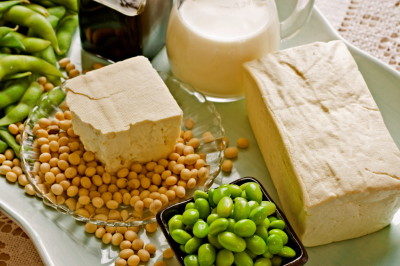There is much debate about whether soy is actually good or bad for you. Here is some information to consider:
What is Soy?
Soy is a bean that is part of the legume family. In its unprocessed form, soy is low in fat and cholesterol. It is high in protein, fibre, Omega-3, vitamin B, and minerals such as iron, calcium and folate. Soy products are products that are made from soybeans. Soy products are classified into two groups: fermented and non-fermented.
Fermented Vs. Non-Fermented Soy Products
If soy is a part of your diet, it is best to choose fermented soy products because they are generally healthier. Fermentation is a natural process which doesn’t destroy the nutrients in the soybeans unlike in non-fermented soy products. Furthermore, fermentation makes the soy protein highly digestable. Research has shown that fermented soy protein can inhibit cancer growth, reduce the risk of osteoporsis as well as heart disease.
Non-fermented soy proteins are not easily digestable as it contains an inhibiter, which discourages the body from digesting protein. It also contains an acid which inhibits the absorption of certain minerals in the intestines. Non-fermented soy proteins can also disrupt normal thyroid function. Research has shown that there is a link between consuming non-fermented and certain types of cancer.
Examples of Fermented Soy Products:
– miso (a paste made from soybeans that can be used in soups and sauces, and as spreads)
– Natto (fermented soybeans)
– Tempeh (similar in texture to firm veggie patty but comes in a block form like firm tofu)
– Naturally brewed soy sauce (most soy sauce sold at grocery stores are made by boiling soybeans at high temperatures for a day, and then adding artifical colours, flavours, and even MSG or an additive similar to MSG such as hydrolyzed vegetable protein)
Examples of Non-Fermented Soy Products:
– Tofu
– Soy milk
– Soy protein isolates (protein powder found in vegetarian products, protien bars, protien shakes, and muscle building powders)
Textured Vegetable Protein
Textured Vegetable Protein, TVP, is commonly referred to as soyameat and is found as an ingredient in veggie burgers and other foods. Although soyameat is thought to be nutritous and a high source of protien, most people do not know that it is a chemically processed food item. To make TVP, soybeans are subjected to high temperatures which denatures the shape and function of the soy protein, and then is processed with a hexane solvent. Hexane a produced by the refining of crude oil and is not only an air pollulant but also a neurotoxin (causes damage to nerve tissue). All products with textured vegetable protien contain trace amounts of residual hexane. Alot of textured vegetable protein products are flavoured with MSG or compounds similar to MSG. Consuming textured vegetable protein regularly may be detrimental to your health.
Vegetarian High-Protein Alternatives
If you are a vegetarian, you may rely heavily on soy products such as soyameat as your source of protein. Here are some alternatives to consider replacing your unfermented soy protein with:
– Tempeh
– Organic Tofu
– Lentils
– Beans (avoid canned beans and other canned products)
– Nuts
– Chia Seeds
– Hemp seeds and hemp powder
– Hummus (a spread from made chickpeas)
– Tempeh
Important things to NOTE:
– Avoid giving your babies, soy infant formula. If your baby suffers from celiac diease or a milk allergy and there is no choice, choose an organic brand.
– Look for fermented soy products.
– Limit tofu and other non-fermented soy products. Choose certified organic tofu products to ensure that the soy is not genetically modified.
– The isoflavones in soy are converted to phytoestrogen by the body which is similar to the human hormone estrogen. This can cause cancer growth in certain cells and infertility in women.
– If you have been diagnosed with breast cancer or are at risk for breast cancer, avoid soy consumption.
– If you are a woman of child-bearing age, trying to conceive or are pregnant, avoid unfermented soy products which contain phytic acid that can obstruct the absorption of zinc which is needed for a healthy reproductive system.
– If you have a thyroid condition such as hypothyroidism , avoid unfermented soy products because it contains a compound called goitrogen which slows down thyroid function.
– Non-fermented soy products contain trypsin which inhibits the body’s ability to digest protein and since protein is needed for cell growth, it is not advisble to give children under 18, non-fermented soy proteins as a regular part of their diet.
– Stay away from products that contain textured vegetable protein or soy protein isolate.
In conclusion…
If soy is a part of your diet, it is best to eat fermented soy products for the most benefits to your body. If you still choose to eat non-fermented soy products, it is best to eat it occasionally and in moderation to avoid any unneccesary health problems.
Additional reading to consider:
Click here to read a summary about the dangers of soy and to get access to some scientitifc studies that show the adverse effects of soy.
Image courtesy of healovebe.com




Hello friends, good article and good urging commented at
this place, I am truly enjoying by these.
Also visit my blog post Werbeagentur Graz
[…] mere face that they contain textured soy protein. You can read why I avoid textured soy protein HERE. Although veggie burgers with textured soy protein are quite delicious, bean burgers are definitely […]
[…] To learn more about soy, check out this post: Is Soy Good or Bad for You? […]
I am looking for some good blog sites for studying. I was searching over search engines and found your blog site.